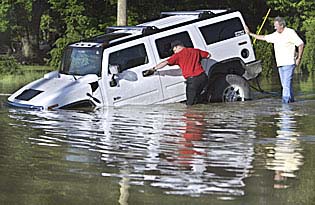Remember that scene in “All the President’s Men,” where Jason Robards/Ben Bradlee says, “We stand by our story.” Yeah, it’s fading for me, too. Maybe, someday, it’ll be gone forever. The better for me.
I’m just reading about an editorial in a Massachusetts newspaper, the Lowell Sun. The Sun published a photograph of two men kissing, to go with a story on the same-sex marriages happening there. Some people called to complain and others called to cancel their subscriptions, so what do you think happened?
1) The Lowell Sun’s version of Jason Robards said, “Tell ’em we stand by our story,” or
2) They published a cringing editorial apologizing for the terrible offense.
You know the answer. Here’s an excerpt: The Sun photo wasn’t intended to shock readers. Rather it was to inform them of the freight train arriving at “Massachusetts Station”, whether we like it or not. Soon that train will depart for other parts of the nation, and arrive with similar force.
If The Sun could turn back the clock, we most likely would select a less intrusive photograph not because the original photo was wrong but because it didn’t fit the go-slow approach we’ve endorsed for a better understanding of this sensitive issue.
Now, I didn’t see the photo. Maybe the kiss was really out-there. Maybe one guy was bent backwards, his throat bulging from the pressure of the other guy’s tongue waaaaay down there, plus someone’s hand was on someone’s ass and leather was involved. Maybe one guy was in Elizabeth Taylor drag. Who the hell knows? But I’d be willing to bet the picture was like dozens we’ve seen since this began in San Francisco earlier in the year — two men exchanging a rather tame kiss on the courthouse steps.
Anyway, that’s not the point. Anyway, it sort of ties in with what people have been saying lately about newspapers v. internet news sources, although it sort of doesn’t, either. (Can I see the hands of everyone ready to entertain the idea that some people searching for the Nick Berg beheading video aren’t looking for evidence of Islamofascism but just might be in the same demographic that made “Faces of Death” such a barn-burner? Thought so.)
Anyway, this was the gist of my Fellowship application, all those months ago: That newspapers have lost their nerve, and when you lose your nerve, you don’t have much more to lose. If I had a dollar for every time I’ve been asked, in a newsroom, “Do you think this will offend our readers?” I wouldn’t be looking for a job today — I’d be living in my beachfront villa in Barbados. And it wasn’t over gay kissing and beheading videos, either; one editor fretted that running a photo of an Olympic beach-volleyball player going up for a spike would offend our readers, because her shorts had ridden up enough to show a sliver of her ass. It just never ended; for years we had an across-the-board no-dead-bodies-ever policy, which had a way of being suspended if the dead bodies were really far away. (In other words, we didn’t run the Pulitzer Prize-winning, iconic photo of the Oklahoma City bombing, but we did run an utterly gruesome picture of dead bodies in the Moscow theater after the hostage siege.) We didn’t run “grief” photos. We dashed out words like “hell” and “damn.” We trod on eggshells.
Now, it’s not as simple as just “throw the stuff in the paper no matter the content.” Your daily newspaper is one of the few general-audience publications left in the household, and in trying to offer something for every niche, it has to be careful. What offends Grandma doesn’t offend her grandson, but more grandmas than grandsons are subscribers these days, and so nine grannies on the phone to the editor can swing a hell of a lot more weight than the membership of the AARP in Congress.
Only guess what? Granny is dying, and her grandson isn’t taking over her subscription, and all over the country editors are tearing their hair out, holding meetings where everyone agrees: We need more pop music coverage in the paper! When the answer, in my opinion anyway, is really very simple: Lead with confidence you’re providing an indispensible product. (Also, this part is very important: Provide an indispensible product.) If Granny calls about the kissing men on Page One, you say, “Ma’am, this is what’s happening in your community. This is our job. Thanks for your call.” None of this go-slow crap. You can’t edit your newspaper to be inoffensive. The news is offensive.
If you’re now thinking, why should I listen to you, you big Hoosier loser?, well, go ahead. You can see where this bold thinking has led me in my brilliant career. It’s just something to consider.
On to other topics:
During my stay in the undisclosed location, I picked up Jane Smiley’s new book, “A Year at the Races.” It’s all about horses, and as a middle-age-horse-crazy gal myself, I’m enjoying it very much. You might, too.
However, avoid “Something’s Gotta Give” if at all possible. That’s unless you’re doing a master’s thesis on the fine art of the phoned-in performance across the board — actors, screenwriter, director, everyone — in which case it’s your foundation text. Roger gave it three and a half? God help us all.
